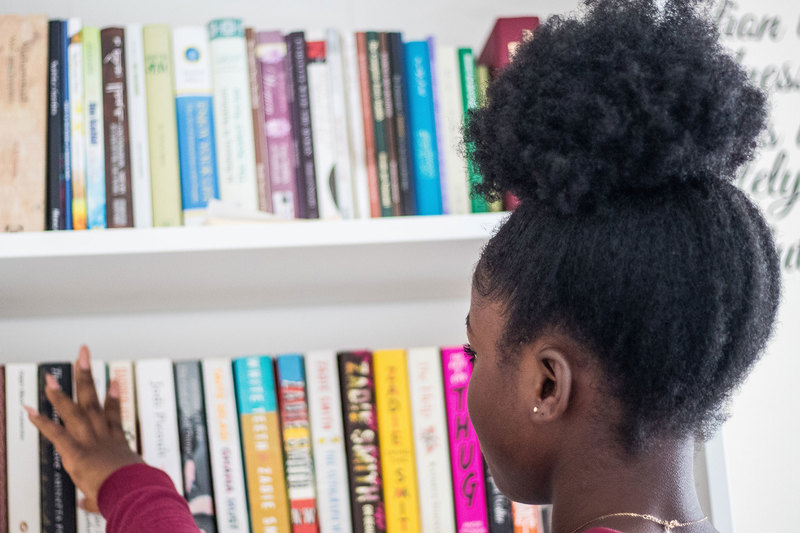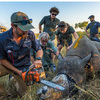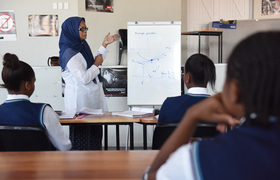‘Give SA children access to rich literacy experiences’
08 June 2023 | Story Niémah Davids. Photo Unsplash. Voice Cwenga Koyana. Read time 9 min.
South Africa has long been in the grips of a literacy crisis, and it has just gotten worse. According to the latest Progress in International Reading Literacy Study (PIRLS), more than 80% of children in Grade 4 cannot read for meaning – a devastating and worrying statistic that signals alarm bells for the future generation of Africa’s rainbow nation.
In light of the PIRLS, the University of Cape Town’s (UCT) Dr Xolisa Guzula, an early literacy specialist in UCT’s School of Education, said the country’s current literacy challenges are perpetuated by inequality. She implored the Department of Basic Education to consider including rich learning experiences into their literacy strategy to help improve literacy levels in the country.
“Our high levels of inequality are a challenge of unspeakable proportions that contribute hugely to our children’s performance in literacy and education more broadly. We recognise that there are no quick fixes to the education challenges that we are experiencing. But there are enough people in academia, non-governmental organisations and civil society with experience in literacy education [who can] contribute ideas to solve the problem,” Dr Guzula said.
“We need to relook our basic education system and we need to start by acknowledging that literacy cannot be imposed from one setting to another.”
“We need to relook our basic education system and we need to start by acknowledging that literacy cannot be imposed from one setting to another. This imposition of imported literacy packages from the United States and the United Kingdom creates a situation where literacy learning is made to be universal, and it’s not, especially not in an unequal society like ours.”
Why SA children can’t read for meaning
The reason, Guzula said, is a three-part problem. South Africa’s unequal education system – one of the many legacies of apartheid – is high on the list. She said previously disadvantaged schools remain disadvantaged today, and fully resourced and equipped schools remain privileged today.
“The disparities are huge. We know that schools in affluent communities have fully stocked libraries, and even have classroom libraries. They also have teachers who balance teaching literacy skills with reading literature and writing for meaningful purposes. Parents of children who attend these schools can also afford to buy books and can make time to read with their children. It’s a whole different ballgame in previously disadvantaged schools in under-resourced communities,” she said.
“English takes over as the medium of instruction [after Grade 3] and there is little effort being done to improve and develop home languages at this level.”
Further, she said a dearth of books published in African languages aimed at children in the intermediate school phase is the second contributing factor. Children in this phase of their school careers continue to read storybooks aimed at foundation phase learners. This, she explained, stifles their progress and development and fails to provide them with the reading support they need. Finally, the language of instruction for African language speakers is a challenge in the classroom. She said African language-speaking children learn in their home languages from Grade 1 to 3 and are automatically expected to switch to English when they reach Grade 4. Guzula said this method of learning places them at a disadvantage compared to their English- and Afrikaans-speaking classmates.
“English takes over as the medium of instruction [after Grade 3] and there is little effort being done to improve and develop home languages at this level,” she said.
“English and Afrikaans literature (fiction and non-fiction) are also freely available and children who speak both languages fluently can make use of these resources quite easily. But it’s not as simple for African-language-speaking children. There are not nearly enough reading resources to go around because it’s just not a priority and there’s lack of non-fiction books to supplement content subject textbooks. We need to change this to support our children.”
A four-point plan
To boost literacy levels among South Africa’s children, Guzula suggested that the Department of Basic Education adopts a special four-point plan as part of their literacy strategy. The plan, developed by the Bua-lit Language and Literacy Collective – a non-profit organisation that advocates for the importance of multilingual language and literacy education in the country – recommends that schools provide children with as many opportunities as possible to engage with reading material. Other points in the plan include:
- Introduce living libraries that include enjoyable, quality illustrated published stories and non-fiction books in familiar languages, including English, in all foundation phase classes. Encourage children to take at least one book home per day.
- Host dedicated in-class reading time where teachers read aloud and discuss interesting, age-appropriate fiction and non-fiction books with the class.
“Children must read as many books as they can and identify different genres in books as well.”
- Dedicate time in each day where teachers engage in shared writing sessions with learners on topics that they are interested in and that draw on a wide range of societal issues.
- Teach explicit literacy skills and knowledge like phonics. By teaching these skills, children need to develop an understanding of text structure; different genres; how stories start, develop and end; and the ingredients, method and mechanics of writing.
“We need to make reading and writing part of daily life. Children must read as many books as they can and identify different genres in books as well. Just like adult book clubs, children should join literacy clubs and engage in book discussions. This will enhance their reading comprehension, as well as their critique of books when they hear different perspectives,” Guzula said.
“Engaging literature helps children to become critical citizens who can recognise and fight injustices in our society and it also improves their writing.”
Developing engaging reading material in African languages
As part of her ongoing effort to develop engaging reading material in African languages, Guzula has been part of the team who recently translated the late Sello Duiker’s Hidden Star – a magical realist book that combines African folklore and contemporary writing. The translation idea was a collaboration between Guzula and colleagues who work in the field of early literacy at the Project for the Study of Alternative Education in South Africa (PRAESA). PRAESA is an NGO focused on producing multilingual children’s literature. The book was released in May and Guzula hopes that it will soon be available in local city libraries.
“By translating Sello Duiker’s Hidden Star, we have started a translation revolution of African authors’ writing from English into isiXhosa. This after years of translating English first-language-speakers’ work into an African language. This is a huge step and a massive transformative project. We have been dreaming about doing this for a very long time to showcase the development of black South African authors’ writing,” she said.
“Writing non-fiction books multilingually can also support children with their school content.”
This latest translation project is not the only one that has kept Guzula on her toes in recent months. She has also collaborated with UCT’s Dr Athambile Masola, an academic in the Department of Historical Studies, to publish three non-fiction books in isiXhosa and English. The books, also available in isiZulu, Sesotho and Afrikaans, explore the lives of South African women (past and present) and the role they played in shaping society – socially, politically and educationally.
Because there are so few books available that highlight local history and the role of women in particular, Guzula said their books aim to plug this gap. She said the women included in the trio of stories are women of extraordinary strength who have and continue to inspire both her and Masola. These women, she added, include social and political activist, Charlotte Maxeke; the first registered African nurse, Cecelia Makiwane; and community and political activist and former first lady, Zanele Mbeki. Guzula and Masola are now in the process of writing another non-fiction book that explains apartheid to children.
“We want children to become more curious about history beyond what they are taught in schools. We hope that these books will inspire conversations between parents, children and grandparents so people can ask more questions related to their own family histories,” she said.
“Writing non-fiction books multilingually can also support children with their school content. This is important as many African-language-speaking children transition to English as a medium of instruction in Grade 4, at a time when they have not yet developed their English proficiency to help them understand their subjects. These books aim to change that and provide children with the learning content they need in languages that they understand, which we are confident will help us turn the tide.”
The translated version of Sello Duiker’s “Hidden Star” is available for purchase at Bargain Books, Loot and Graffiti Books.
 This work is licensed under a Creative Commons Attribution-NoDerivatives 4.0 International License.
This work is licensed under a Creative Commons Attribution-NoDerivatives 4.0 International License.
Please view the republishing articles page for more information.










